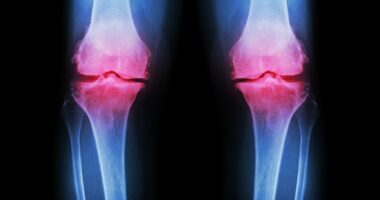Share this @internewscast.com
Hamburgers, potato chips and chocolate milk can be a tempting treat, but a new study suggests they could undermine your sex drive.
In Europe, researchers discovered that when men aged 20 to 35 consumed an ultra-processed diet, they gained weight and experienced a drop in testosterone levels within just three weeks.
They also saw declines in hormones linked to sperm production and testicular function
Together, these decreases could lead to diminished sex drive and muscle mass, as well as impaired fertility and cognitive function.
The team also found that those eating a highly-processed diet had more phthalates in their blood, which can disrupt hormones and affect fertility.
These effects were not seen in the same group eating a largely unprocessed diet, even though the diets were matched for calories and nutrients.
Dr. Jessica Preston, who leads the study as a metabolism researcher, stated: ‘Our findings indicate that ultra-processed foods negatively affect our reproductive and metabolic health, even without overconsumption.
‘This indicates that it is the processed nature of these foods that makes them harmful.’
The study highlights that ultra-processed foods generally lack fiber compared to whole foods. This makes them highly appealing while also leading to increased calorie absorption from meals, which contributes to weight gain.

Scientists said that eating an ultra-processed diet raised the risk of weight gain and fertility problems in males (stock image)
Ultra-processed foods today make up a major part of the American diet, with the CDC saying they account for 55 percent of daily calories.
The research, published in the journal Cell Metabolism, involved participants consuming a predominantly ultra-processed diet for three weeks, then switching to a mostly unprocessed diet for another three weeks, with a three-month interval in between.
The unprocessed and ultra-processed diets were matched to contain exactly the same number of calories, proteins, carbohydrates and fats.
The men were divided into two groups: one group consumed only the calories their bodies required, while the other consumed an additional 500 calories on both diets.
The largely unprocessed diet included scrambled eggs, bananas, salads with chickpeas and chopped mango or pineapple.
While the largely ultra-processed diet was made up of foods including protein bars, pulled pork, bread, barbecue sauce, candies and coleslaw.
The ultra-processed diet also contained higher levels of saturated fat, cholesterol, added sugars, and dairy, but lower amounts of fiber compared to the unprocessed diet.
The researchers said their aim was for at least 75 percent of calories to be derived from processed foods or unprocessed foods in either diet plan.

The above graphic is a sketch of what a standard meal looked like on the largely unprocessed and largely ultra-processed diets
Overall, compared to when they ate unprocessed diets, the men gained an average of 3lbs and 2.2lbs of fat when they followed the processed diet.
They also had drops in the follicle-stimulating hormone, FSH, and in testosterone compared to the largely unprocessed diet group.
These hormones regulate sexual function and the production of sperm, with researchers warning that this decline could affect a man’s libido and fertility.
Researchers also found those on the largely ultra-processed diet had higher blood levels of cxMINP, a type of phthalate added to food packaging to make them more flexible that can disrupt hormones in humans.
Those on the high-calorie ultra-processed diet also had reduced sperm motility, or a reduction in sperm’s ability to transport.
Those who ate a largely unprocessed diet had higher levels of mercury in their blood, which has been linked to neurological problems at higher concentrations, although these didn’t reach levels to concern the scientists.
This is likely because this diet contained more fish, which contains higher levels of the substance.

The decreases in hormones observed in men eating an ultra-processed diet could lead to diminished sex drive and muscle mass, as well as impaired fertility and cognitive function
Dr Marion Nestle, a nutritionist in New York who was not involved in the study, told the Washington Post that the findings added to overwhelming evidence that diets based on ultra-processed foods are not good for people.
‘The big shocker here,’ she added, ‘is the potential effect on male fertility’.
It was not clear whether an ultra-processed diet would have a similar impact on female fertility.
Male fertility has been in decline for at least the last 50 years, with global sperm counts estimated to have fallen by half between 1973 and 2018.
The reduction is believed to be in part due to exposure to industrial chemicals such as pesticides, which can harm the functioning of sexual organs.
But it has also been linked to rising obesity rates and lower levels of activity, which are similarly said to be affecting male fertility.
This study is among the first to also link it to the content of an ultra-processed diet.
The study was published in the journal Cell Metabolism.

















